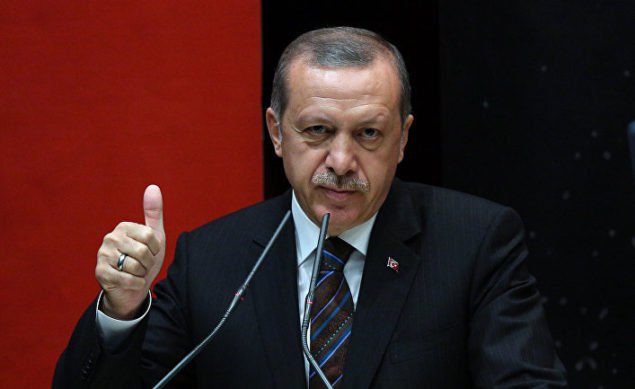Olga Łabendowicz: ‘The Polish Society Seems to Be Awakening’
11.03.2017 It’s after Donald Tusk reelection as President of the European Council that the government in Warsaw has again accused Berlin of ‘dictate’. What’s going on in Poland’s political life? Is there any promising liberal opposition to the current government policy mounting in the country? Can Polish democracy overcome conservative populism? About the above and more, we’ve talked to Olga Łabendowicz, who is the Editor-in-Chief of 4liberty.eu Review– a magazine devoted to economic, political and social issues in the CEE states and Coordinator of 4liberty.eu Network on behalf of Friedrich Naumann Foundation for Freedom
It’s after Donald Tusk reelection as President of the European Council that the government in Warsaw has again accused Berlin of ‘dictate’. What’s going on in Poland’s political life? Is there any promising liberal opposition to the current government policy mounting in the country? Can Polish democracy overcome conservative populism? About the above and more, we’ve talked to Olga Łabendowicz, who is the Editor-in-Chief of 4liberty.eu Review– a magazine devoted to economic, political and social issues in the CEE states and Coordinator of 4liberty.eu Network on behalf of Friedrich Naumann Foundation for Freedom
The recent populous and a somewhat violent protest in Poland – does it mean that the government has crossed some intuitive ‘red line’?
It depends whom you ask. On the one hand, the Law and Justice government still enjoys a high support of the population (although according to the IBRiS poll, it declined slightly in October in the midst of the protest against introducing a restrictive abortion regulations, now it seems to be picking up – Milward Brown for TVN reports that it has increased to 38% after the crisis) what might signify that everything is okay.
 On the other hand, economists, constitutionalists, journalists and environmentalists point out the further meddling of the government in the matters of state they should not put their hands on (such as first and foremost the Constitution and the Constitutional Tribunal) and thus having a detrimental effects on the respective areas. And since the Law and Justice party has the majority in the Parliament, there’s nothing the opposition parties can actually do about it. This is why they resort to protests and demonstrations. And people follow in their footsteps (or organize demonstrations on their own) because they understand that although having a vision (that may not be in line with their ideas and beliefs) is not a crime, then suspicious, hasty and often simply spiteful decisions and utterances of the current leaders of our country, cannot be abided by. Especially when someone is neither a part of the government, nor a president and yet his influence is being legitimized by those entities thus allowing an individual to shape and shake the state according to his will (or whims). That’s what Jarosław Kaczyński is currently doing. After all, you need to have guts to say to Reuters that “In the political sphere, you can say I have serious authority, (…) But in reality, the majority of decisions … are taken without my will and without my consciousness”. As if that needed to be stated…
On the other hand, economists, constitutionalists, journalists and environmentalists point out the further meddling of the government in the matters of state they should not put their hands on (such as first and foremost the Constitution and the Constitutional Tribunal) and thus having a detrimental effects on the respective areas. And since the Law and Justice party has the majority in the Parliament, there’s nothing the opposition parties can actually do about it. This is why they resort to protests and demonstrations. And people follow in their footsteps (or organize demonstrations on their own) because they understand that although having a vision (that may not be in line with their ideas and beliefs) is not a crime, then suspicious, hasty and often simply spiteful decisions and utterances of the current leaders of our country, cannot be abided by. Especially when someone is neither a part of the government, nor a president and yet his influence is being legitimized by those entities thus allowing an individual to shape and shake the state according to his will (or whims). That’s what Jarosław Kaczyński is currently doing. After all, you need to have guts to say to Reuters that “In the political sphere, you can say I have serious authority, (…) But in reality, the majority of decisions … are taken without my will and without my consciousness”. As if that needed to be stated…
There is no doubt that the government (or MrKaczyński, if we want to be precise) has their own vision of Poland. And although, as a rule, there is nothing wrong with that – what the Law and Justice party often emphasizes – since the majority of citizens truly did give them a vote of confidence last year, it quickly becomes evident that if it already managed to interfere in so many aspects in a year (attempts to amend the Constitution, paralyzing the Constitutional Tribunal, intended ban on abortion, lowering the retirement age, education reform, environmental amendments), then after the next three years, Poland may really become a country much changed. And not necessarily in a good way.
 Seems like any early election is a very distant perspective – what then might be the goal of protests, just to ‘be heard’?
Seems like any early election is a very distant perspective – what then might be the goal of protests, just to ‘be heard’?
Precisely. Of course, there occur some voices which call for the President and the government to resign, but I do not believe that would be realistic. The Law and Justice party (and bear in mind that both, the government and the President, having their political origins in the ruling party are fully at its disposal – which became even more apparent after the recent TV statement by PM Beata Szydło, who accused the opposition of “harming Poland”, and President’s Andrzej Duda written statement in response to the protests related to an attempt to limit the open access of all media to the parliamentary building – result in the PM and the President scorning the opposition for making big fuss about what’s happening in Poland, and not behaving in a responsible political way) still wields the power in Poland and holds it in its hands.
Although they seem to be determined to complete the process of “law-and-justicing” Poland, thanks to the protests they have already taken a few steps back as far as their controversial ideas were concerned – e.g. in the case of the already mentioned abortion ban. They may not listen to reason, but they definitively understand the power of protests – especially when these are backed by the foreign media coverage – although they dismiss them as inaccurate and biased, foreign media and economic ratings still can serve as leverage in negotiating with the government. After all, it would much rather pass all the changes quietly than when all eyes are on them drawn due to the ongoing protests.
Why did the budget procedure sparkle the public emotion so much?
It is crucial to understand that prior to the voting on the budget the emotions were already really high. On December 13, the Chancellery of the Sejm declared the idea of changing the so far unrestricted access of the media to the Parliament and limiting it in several respects (what, according to the initiators of the idea was inspired by solutions introduced in other countries and the European Parliament): creating a Media Centre (which also implies that journalists would not be allowed to ask the parliamentarians questions on the corridors) in the building and limiting the number of passes for each media outlet to just two reporters (by now it was unlimited) who shall be selected from journalists with “documented past as political reporters”. At the same time, it was believed that the limitations would not be so strict for the representatives of the national media. This sparked outrage.
On December 16, the budget was being voted on in the Parliament around 4:00pm. During the plenary session, the opposition called for revoking the plans on limiting the media access. When MP Michał Szczerba from Civic Platform – while trying to introduce amendment into the budget in the form of subsidizing culture – first placed on the rostrum a piece of paper with a sign “FREE MEDIA” written on it, it already irritated the Marshal of the Sejm Marek Kuchciński (Law and Justice) enough to reprimand the MP, so he took the sign down and attempted a joke: “Dearest Marshal, music makes the heart grow fonder…” (in reference to subsidizing a Sinfonia Varsovia orchestra) but was immediately interrupted by the marshal, who turned the microphone off, for the second time reprimanded the MP and excluded him from the session. In turn, the opposition demanded revoking the decision and blocked the rostrum and presidium. The marshal declared recess. In the meantime, the leader of Law and Justice, Jarosław Kaczyński, referred to the actions of opposition as “parliamentary hooliganism”.
Around 8:00pm the leader of the Committee for the Defense of Democracy (KOD) Mateusz Kijowski organized in front of the Parliament a demonstration. Several thousands of people attended. The representatives of a pro-constitutional and pro-democratic organization Obywatele RP (Citizens of the Polish People’s Republic) tried to enter the building of the Parliament but were refused access by the police. At around 9:30pm, the marshal moved the session to the Column Hall, where the budget was passed by the MPs of Law and Justice party and two MPs of the Kukiz’15 party, who were present. The opposition stated that it was refused access to the room. However, in a statement published on December 21, on the website of the Sejm, Marshal Kuchciński emphasizes that “every MP could enter the Collumn Hall by the main entrance and participate in all votes”. Voting took place by raising one’s hand, which in turn made it impossible to check how each MP voted on other matters. All this led to further escalation of emotions in the media, society and more protests.
The next day, the Marshal’s Guard asked the police for assistance in “securing safety and order on the premises of the Sejm as well as on the grounds if the Sejm” – as we can read in a statement from December 20. There is therefore no wonder that it looked like the Parliament was being somehow shielded from both, the public and the media. The quick escalation of the issue was, however, the result of lack of good will of the marshal and the strongly rooted in the governing party lack of willingness to cooperate with anyone – may it be the opposition, or the non-national media. The problem is that right now everything is taken either too seriously by some, or not seriously enough by others. Can a balance be reached and a dialogue initiated? This remains to be seen.
Is this the point at which we start observing a strong and broad anti-Conservative opposition front in Poland?
I do not believe that the current events show that the Polish traditionally rather conservative society begins to thaw. Globalization has already done as much as it could in this respect opening the society for other cultures and more liberal ideas of tolerance. But maybe it’s not so much about thawing but rather about who is the most visible for the time being. Rebels who question a given matter are always much more visible than conformists. The Committee for the Defense of Democracy (KOD) does its utmost to engage people in protesting against the recent political developments, but the truth is that it seems to also awaken some old sentiments of the nationalists, who – reinforced by the Catholic Church and not scolded enough by the people in power – grow stronger. The entire generation of rebel-wannabes finally found an outlet for their urge to act, to say what bothers them and to be heard.
Poles respond well when under pressure and when necessity calls – the society which to some extent politically fell asleep in the 1990s and 2000s now seems to be awakening. Does it mean that the necessity calls right now? It seems it does. In the country with strong protest traditions, this means exactly the awakening of the polarized civil society united by one of two causes: clipping coupons of the so-called good change or undermining the merits and legality of the changes.
What if the legitimate government – as it apparently is – will crack down upon opposition street demonstrations in a brutal policing way? What is going to happen?
They may be populists and they may feel that the state is now their property for the time being, but I do not think they would resort to physical force. It’s more like a theatre – they want to show the society and the opposition that they have a monopoly for a) power, b) the truth, and c) control. However, the memory of the brutality of state actions in the Polish People’s Republic is still very much alive in people’s minds, also in the minds of the government – at least that’s what we choose to believe – therefore it is very unlikely that such brutal actions would take place. Poland is not Turkey. At least not yet and hopefully not ever.
Does the liberal part of the Polish society have enough moral authority to somehow adjust the conflict so it can be brought back to the established democratic procedure?
The answer is sad but simple: no. As long as Law and Justice has the majority in the Parliament, the only thing the part of the society which can be considered as opposition, can only voice their concerns. Whether the government will listen or not depends on whether they see something in it for them. The MPs were selected in a democratic way, the president as well. And thus now we must all bear the consequences, also the liberals.
Finally, in your opinion, what does the unrest communicate to the outside world – a sign of a healthy democracy, or one of a deepening political crisis?
I think it does both and that’s actually a no brainer. It’s not a novelty that democracy has its faults – look at the United States; they have in store quite a big challenge as a result of a democratic system as well. First of all, I believe that democracy was and never will be healthy – it is just a system, and systems easily fail, just like computers – even the ultra-technologically advanced ones. It is the human aspect that always has to be there to make some corrections, if necessary. And that’s the thing about it. Nowadays more and more people blame democracy for everything wrong that is happening. I get where they are coming from but then again, they forget that it is also their job to put everything back into order. To monitor, evaluate and make corrections. It’s just like in Shakespeare’s Julius Caesar: “ The fault (…) is not in our stars, but in ourselves”.
As for the other part of the question: of course Poland is in the state of a deepening political crisis. The government will not rest until Poland is shaped the way Jarosław Kaczyński wishes. The problem is that it behaves like a spoiled child, who at first is excited to play with other kids in a sandbox, but then much rather keeps all its shovels and buckets to itself. And as a result, manages to build only sand castles.
The Russian-language version is available at: Fraza

